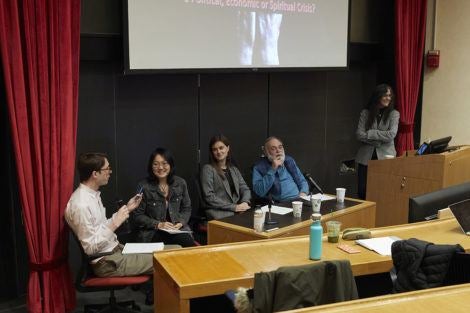November 26, 2019 – Since 2005, many leading causes of death, including cardiovascular disease, cancer, stroke, and lung disease, have been decreasing. But deaths from drugs, alcohol, and suicide—what some call “deaths of despair”—have been on the rise.
A panel of faculty and students from Harvard T.H. Chan School of Public Health’s Department of Global Health and Population (GHP) delved into the potential causes of these deaths at a November 18, 2019 event in Kresge G3. For the event, part of a GHP series on critical thinking about important topics, three GHP students were asked to make the case as to whether the deaths represent a political, economic, or spiritual crisis. (The topic was prompted by a recent New York Times opinion piece.)
The event was moderated by GHP chair Marcia Castro and Richard Cash, senior lecturer on global health.
The political case
Master of science student Elizabeth Hentschel argued that the deaths are the result of deep structural and social issues in American society that have been brewing since the mid-1980s, including a drug-overdose epidemic that has moved from cocaine to prescription opioids to heroin to fentanyl. Income inequality, which is at its highest point in 50 years, has also played a role, she said.
The economic case
James Potter, PhD student in population health sciences, said that downturns in the economy have been largely to blame, leading to depression and drug use and, ultimately, to spikes in despair-related deaths. He suggested that the notion of the “American Dream” may play a role in people’s despair, since it is based on the idea of personal responsibility—that if you’re successful, it’s because of something you did right, and if not, it’s because of something you, not society, did wrong.
The spiritual case
Master of science student Yuning Liu proposed that the deaths stem mostly from mental health issues and a lack of spiritual health. Financial problems among U.S. families can lead to increased childhood deprivation, which has been linked with mental health issues, she said. She also cited the rising use of social media and a decrease in social cohesion in America as potentially negative influences on mental and spiritual health.

Three faculty members who advised the students on their presentations also spoke, including Mary Bassett, director of the FXB Center for Health and Human Rights, who mentored Hentschel; Vikram Patel, professor in the Department of Global Health and Population, who mentored Liu; and David Canning, Richard Saltonstall Professor of Population Sciences and Professor of Economics and International Health, who mentored Potter.
Bassett commented that the term “deaths of despair” only made headlines in America when death rates rose among a narrow group of white men, in spite of the fact that mortality rates among blacks have long been higher than that of whites, and mortality rates are on the rise among indigenous peoples.
Patel said that while it’s important to curb deaths of despair with interventions like treatment for opioid addiction, it’s also important to address spiritual issues. Research has suggested that having a sense of purpose in life and strong social connections can be powerful factors in promoting health and well-being, he noted.
Canning spoke about the massive rise in inequality and the fact that the current generation is doing worse than previous generations. “It’s very hard for any society to cope with,” he said.
photos: Kent Dayton
Watch a video of the event: The Age of American Despair: Are Deaths from Drugs and Alcohol and Suicide a Political, Economic or Spiritual Crisis?
